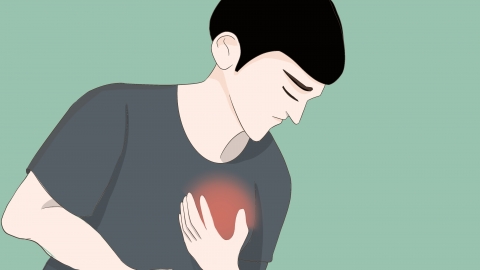Why do I feel palpitations and shortness of breath when emotionally excited?
Generally, palpitations and shortness of breath triggered by emotional excitement may be caused by autonomic nervous system activation, hyperventilation syndrome, arrhythmia, bronchial asthma, coronary heart disease, or other conditions. If discomfort occurs, it is recommended to seek timely medical evaluation and treatment at a reputable hospital. Specific causes are analyzed as follows:

1. Autonomic Nervous System Excitation
During emotional excitement, the sympathetic nervous system becomes activated, causing increased heart rate and blood vessel constriction, leading to palpitations and shortness of breath. Calm down immediately, regulate breathing rhythm through deep breathing, shift attention to relaxing activities, and avoid further emotional fluctuations.
2. Hyperventilation Syndrome
Rapid breathing during excitement leads to excessive elimination of carbon dioxide, resulting in respiratory alkalosis, which can cause palpitations, shortness of breath, and numbness in hands and feet. Cover the mouth and nose with a plastic bag and breathe slowly to reduce CO₂ loss, while maintaining emotional stability and slowing down respiration.
3. Arrhythmia
Emotional fluctuations may disrupt normal electrical activity in the heart, causing abnormal heart rhythms and resulting in palpitations and shortness of breath. Medications such as metoprolol tartrate tablets, propafenone hydrochloride tablets, or amiodarone tablets may be taken under medical supervision. Avoid intense emotions and excessive fatigue.
4. Bronchial Asthma
Emotional excitement may trigger spasms of airway smooth muscles, narrowing the airways and obstructing airflow, leading to palpitations, shortness of breath, and wheezing. Use salbutamol inhaler, budesonide/formoterol powder inhaler, or montelukast sodium chewable tablets under medical guidance, and avoid exposure to allergens.
5. Coronary Heart Disease
Emotional excitement increases myocardial oxygen demand sharply, causing insufficient coronary blood supply and myocardial ischemia, which results in palpitations, shortness of breath, and chest pain. Medications such as enteric-coated aspirin tablets, nitroglycerin tablets, or rosuvastatin calcium tablets may be taken under medical supervision. In severe cases, coronary stent implantation may be required.
In daily life, learn to regulate emotions and avoid anger or anxiety; maintain regular sleep patterns and avoid staying up late; eat a light diet and reduce intake of high-fat and high-salt foods; engage in moderate exercise to enhance cardiopulmonary function; and undergo regular physical check-ups to monitor heart and lung health.




